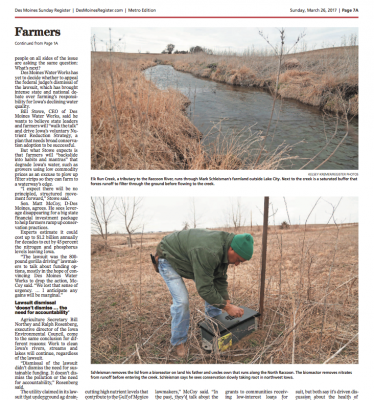The House Agriculture Committee advanced the Republican-led farm bill in a 34-17 vote early Thursday after a marathon markup that was clouded by partisan fighting about the package.
Clean Water Act: Des Moines Water Works Lawsuit Revisited
Recall that back in January, a FarmPolicyNews update discussed an important legal case in Iowa that challenged the general exemption for agricultural storm water discharges under the Clean Water Act, among other issues. The Iowa Supreme Court ruled on a portion of the case in January, and earlier this month, a federal judge dismissed the case. Today’s update provides a brief overview of some portions of the Iowa case and notes that water related issues still lurk in the future for agricultural producers.
Des Moines Water Works (DMWW) Case Ruling
Back on March 18th, Donnelle Eller reported on the front page of The Des Moines Register that, “A federal judge has dismissed Des Moines Water Works’ lawsuit against drainage districts in three northern Iowa counties the utility claimed are funneling high levels of nitrates into the Raccoon River, a source of drinking water for 500,000 central Iowa residents.
“Federal Judge Leonard Strand dismissed all of Water Works’ claims against drainage districts in Sac, Buena Vista and Calhoun counties, determining that Iowa’s water quality problems are an issue for the Iowa legislature to resolve.
“In dismissing part of the lawsuit, Strand wrote Des Moines Water Works ‘may well have suffered an injury,’ but the drainage districts have no power to address them.”
FrtPg @DMRegister Judge throws out Water Works nitrates lawsuit, @DonnelleE https://t.co/XKCT5Qvvy1 add'l background-https://t.co/mWfKaESnFN pic.twitter.com/70NnQnuxG3
— Farm Policy (@FarmPolicy) March 18, 2017
Ms. Eller pointed out that:
The Des Moines utility sought to have the drainage districts, and indirectly farmers, regulated under the federal Clean Water Act as a ‘point source’ of pollution, much like businesses and manufacturing plants.
The article added that, “The Des Moines utility said ‘since the ruling concluded Des Moines Water Works could not bring this lawsuit,’ it doesn’t address whether ‘agricultural drainage tile is a ‘point source’ as defined by the Clean Water Act.'”
Procedurally, the Register article indicated that, “[Federal Judge] Strand sided with the Iowa Supreme Court, which ruled in January that Des Moines Water Works could not obtain damages from north Iowa drainage districts to reimburse the utility for the cost of cleaning excess nitrates from the water.
“Through a rare procedural move known as a ‘certified question,’ state Supreme Court justices were asked to tackle questions about state law before the federal judge issued a decision.
“‘Drainage districts lack the broad police powers exercised by counties and other political subdivisions,’ Strand wrote, citing the Supreme Court.”
The article added that, “Ralph Rosenberg, director of the Iowa Environmental Council, agreed the state — from lawmakers to Gov. Terry Branstad — faces more pressure to ‘step up’ and address water quality challenges.
“‘We’re back to square one on who’s responsible’ for cleaning Iowa’s lakes, rivers and streams, Rosenberg said, adding that the lawsuit would have helped provide clarity.”
DTN writer Todd Neeley reported on March 17th that, “The [federal] court ruled drainage districts lack the authority to redress DMWW’s claims, meaning the utility has no standing to sue drainage districts.
The ruling, however, does not address whether agricultural drainage tile is a pollution point source in the Clean Water Act.
Looking Ahead- Issues Remain
Writing on the front page of Sunday’s Des Moines Register, Donnelle Eller reported that, “Farmer Mark Schleisman firmly believes that Des Moines Water Works’ decision to sue over high nitrate levels in the Raccoon River was the wrong way to get more farmers to embrace conservation practices across Iowa’s 26 million corn and soybean acres.
“But Schleisman hopes the dismissal of the utility’s lawsuit two weeks ago doesn’t lessen the pressure that farmers — or Iowa lawmakers — feel to implement more cover crops, grass waterways, wetlands and other practices to help prevent soil erosion and nitrogen and phosphorus losses.”

Sunday’s article noted that:
After the lawsuit’s dismissal, people on all sides of the issue are asking the same question: What’s next?
“Des Moines Water Works has yet to decide whether to appeal the federal judge’s dismissal of the lawsuit, which has brought intense state and national debate over farming’s responsibility for Iowa’s declining water quality.”
Ms. Eller noted that, “Experts estimate it could cost up to $1.2 billion annually for decades to cut by 45 percent the nitrogen and phosphorus levels leaving Iowa.”
And the article added that, “[Iowa Agriculture Secretary Bill Northey] said state funding has climbed from $4.4 million in 2013 to about $9.5 million this year to help farmers try cover crops and no-till planting, along with developing watershed demonstration projects.”
“Carol Balvanz, policy director at the Iowa Soybean Association, said state budget shortfalls — $249 million this fiscal year, with $131 million covered by reserves — make significant water-quality funding this year tough,” the article said.
The Des Moines Register editorial board, in an opinion item in Sunday’s paper, opined that, “The deteriorating state of Iowa’s rivers and streams is more than an environmental, quality-of-life issue; it’s also becoming a major burden on taxpayers and water-utility ratepayers and a threat to Iowa’s ag-based economy. But you’d never know that by the way the Branstad administration and many legislators cling to the status quo, arguing that Iowa needs only to continue its ‘collaborative approach’ to reducing the farm-related pollution of our waterways.”

The opinion item noted that, “When U.S. District Court Judge Leonard Strand dismissed the Water Works’ lawsuit against five Iowa drainage districts nine days ago, he did so on the grounds that the utility was making a ‘policy argument, not a constitutional one,’ best handled by the Iowa Legislature. The judge’s reasoning is sound but for the fact that water quality is an issue Iowa’s state lawmakers refuse to address.”
The editorial concluded by noting that, “With the federal government walking away from its environmental responsibilities, Iowa legislators can no longer afford to sit by and wring their hands.”
Water quality issues and conservation policy will likely continue to be an issue that lawmakers in Iowa and other farm states continue to grapple with. And at the federal level, the Trump administration has indicated a desire to cut the Environmental Protection Agency budget by 31 percent, and the U.S. Department of Agriculture discretionary budget by 21 percent, which could put further pressure on the debate.





